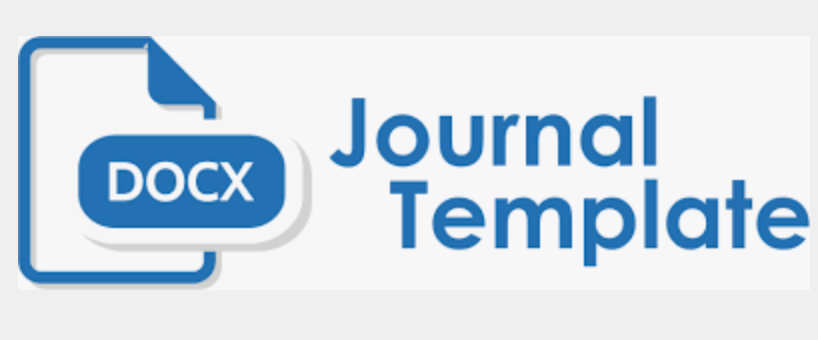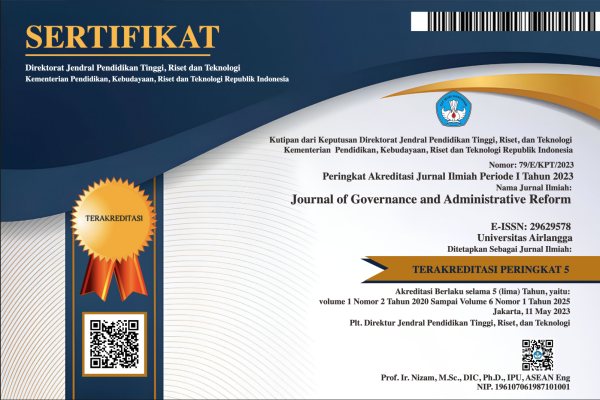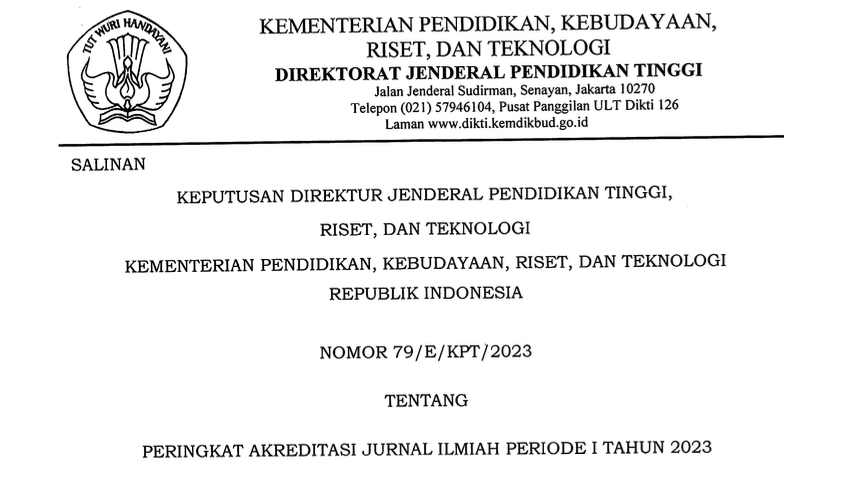Guide for authors Online Submission Author's Statement Letter
Editorial Policies
- Focus and Scope
- Section Policies
- Peer Review Process
- Publication Frequency
- Open Access Policy
- Archiving
- Publications Ethics
- Article Processing Charge
- Plagiarism Screening
Focus and Scope
Journal of Governance and Administrative Reform (JGAR) is a journal with open access and peer-reviewed journals. The aim of JGAR is to publish critical and original articles that advance theoretical understanding and practice of public administration through research. The JGAR Journal encourages, and is open to, papers writing using quantitative and qualitative research methods as well as a mixture of qualitative and quantitative. Journal of Governance and Administrative Reform (JGAR) focuses on Governance and Administrative Reform. This journal has scopes such as public policy, governance, administrative reform, government reform, public service, and electronic governance, covers themes related to administration and governance.
Section Policies
Articles
Article Review
Book Reviews
Peer Review Process
1. Review Policy
Journal of Governance and Administrative Reform (JGAR) accepts articles based on research, article reviews of literature studies, and book reviews in the field of public administration. All submissions are reviewed on a double-blind policy by at least two independent reviewers and must apply the Journal of Governance and Administrative Reform (JGAR) citing style. Authors must submit a signed anti-plagiarism statement. The average number of weeks between article submission and publication is 6 (six) weeks.
2. Review Instructions
The peer review process starts after you submit your article to the JGAR website. After the article is accepted by the editor, it will be sent for assessment by an independent expert in the field of public administration. Reviewers are asked to rate the validity, significance, and originality of your work. Peer review is an independent assessment of research articles, literature reviews, and book reviews in the field of public administration by experts in the field. The purpose of peer review is to evaluate the quality and suitability of papers for publication. In addition to acting as a form of quality control for JGAR academic journals, it is a very useful source of feedback on your articles. Feedback can be used to improve your paper before publication. So at its best, peer review is a collaborative process, in which the author engages in dialogue with colleagues in the field of public administration. Reviewers are people who test and refine each article before publication. Feedback and comments from carefully selected reviewers are an important guide to editors' decisions on articles.
3. Review Process
The editor will accept manuscripts submitted to JGAR, and once the paper has passed editorial review, it will be sent to peer reviewers. Each manuscript is reviewed by at least two independent reviewers chosen for their expertise during the peer-review process. All review procedures were conducted in a double-blind review, meaning neither the authors nor the peer reviewers knew one another's identities. After the review request has been issued, reviewers have three weeks to finish the review process. After that, the decision will be made by the editor.
Publication Frequency
Journal of Governance and Administrative Reform is published twice a year, in June and December.
Open Access Policy
This journal provides immediate open access to its content on the principle that making research freely available to the public supports a greater global exchange of knowledge.
The journal allows readers to read, download, copy, distribute, print, search, or link to the full texts of its articles and allows readers to use them for any other lawful purpose.

Journal Governance and Administrative Reform by Unair is licensed under a Creative Commons Attribution-ShareAlike 4.0 International License.
Archiving
This journal utilizes the PKP PN, LOCKSS, and CLOCKSS systems to create a distributed archiving system among participating libraries and permits those libraries to create permanent archives of the journal for purposes of preservation and restoration.
Publications Ethics
Ethical guidelines for journal publication
The Journal of Governance and Administrative Reform (JGAR) is open access. Peer-reviewed scientific journal based on a double-blind policy by at least two reviewers. JGAR is published by the Faculty of Social and Political Sciences, Universitas Airlangga, Indonesia. The objective of Journal of Governance and Administrative Reform (JGAR) is to publish original research articles from researchers, article reviews of literature studies, and book reviews in the field of public administration.
Universitas Airlangga as the publisher of Journal of Governance and Administrative Reform (JGAR) takes its duties of guardianship over all publishing stages exceptionally seriously, and we recognise our ethical and other responsibilities. We are committed to ensuring that advertising, reprints, or additional commercial revenue has no impact or influence on editorial decisions. The Editorial Board will assist in communications with other journals and/or publishers where this is useful and necessary.
This statement is based on COPE's Best Practice Guidelines for Journal Editors.
Duties of Authors
-
Reporting Standards
Authors of reports of original research should present an accurate account of the work performed as well as an objective discussion of its significance. Underlying data should be represented accurately in the paper. A paper should contain sufficient detail and references to permit others to replicate the work. Fraudulent or knowingly inaccurate statements constitute unethical behavior and are unacceptable. -
Data Access and Retention
Authors may be asked to provide the raw data in connection with a paper for editorial review. They should be prepared to provide such data within a reasonable time. -
Originality and Plagiarism
The authors should ensure that they have written entirely original works, and if they have used the work and/or words of others, this has been appropriately cited or quoted. -
Multiple, Redundant, or Concurrent Publication
An author should not, in general, publish manuscripts describing essentially the same research in more than one journal or primary publication. Submitting the same manuscript to more than one journal concurrently constitutes unethical publishing behavior and is unacceptable. -
Acknowledgment of Sources
Proper acknowledgment of the work of others must always be given. Authors should cite publications that have been influential in determining the nature of the reported work. -
Authorship of the Paper
Authorship should be limited to those who have made a significant contribution to the conception, design, execution, or interpretation of the reported study. All those who have made significant contributions should be listed as co-authors. Where there are others who have participated in certain substantive aspects of the research project, they should be acknowledged or listed as contributors. The corresponding author should ensure that all appropriate co-authors and no inappropriate co-authors are included on the paper and that all co-authors have seen and approved the final version of the paper and have agreed to its submission for publication. -
Disclosure and Conflicts of Interest
All authors should disclose any financial or other substantive conflict of interest in their manuscript that might be construed to influence the results or interpretation of their manuscript. All sources of financial support for the project should be disclosed. -
Fundamental errors in published works
When an author discovers a significant error or inaccuracy in his/her own published work, it is the author's obligation to promptly notify the journal editor or publisher and cooperate with the editor to retract or correct the paper. -
Hazards and Human or Animal Subjects
If the work involves chemicals, procedures, or equipment with any unusual hazards inherent in their use, the author must clearly identify these in the manuscript.
Duties of Editors
-
Fair Play
An editor evaluates manuscripts at any time for their intellectual content without regard to race, gender, sexual orientation, religious belief, ethnic origin, citizenship, or political philosophy of the authors. -
Confidentiality
The editor and any editorial staff must not disclose any information about a submitted manuscript to anyone other than the corresponding author, reviewers, potential reviewers, other editorial advisers, and the publisher, as appropriate. -
Disclosure and Conflicts of Interest
Unpublished materials disclosed in a submitted manuscript must not be used in an editor's own research without the author's express written consent. -
Publication Decisions
The editor board journal is responsible for deciding which of the articles submitted to the journal should be published. The validation of the work in question and its importance to researchers and readers must always drive such decisions. The editors may be guided by the journal's editorial board's policies and constrained by such legal requirements as shall then be in force regarding libel, copyright infringement, and plagiarism. The editors may confer with other editors or reviewers in making this decision. -
Review of Manuscripts
The editor must ensure that the editor for originality initially evaluates each manuscript. The editor should organize and use peer review fairly and wisely. Editors should explain their peer review processes in the information for authors and indicate which parts of the journal are peer-reviewed. The editor should use appropriate peer reviewers for papers considered for publication by selecting people with sufficient expertise and avoiding those with conflicts of interest.
Duties of Reviewers
-
Contribution to Editorial Decisions
Peer review assists the editor in making editorial decisions, and through editorial communications with the author, it may also assist the author in improving the paper. -
Promptness
Any selected referee who feels unqualified to review the research reported in a manuscript or knows that its prompt review will be impossible should notify the editor and excuse himself from the review process. -
Standards of Objectivity
Reviews should be conducted objectively. Personal criticism of the author is inappropriate. Referees should express their views clearly with supporting arguments. -
Confidentiality
Any manuscripts received for review must be treated as confidential documents. They must not be shown to or discussed with others except as authorized by the editor. -
Disclosure and Conflict of Interest
Privileged information or ideas obtained through peer review must be kept confidential and not used for personal advantage. Reviewers should not consider manuscripts in which they have conflicts of interest resulting from competitive, collaborative, or other relationships or connections with any authors, companies, or institutions connected to the papers. -
Acknowledgment of Sources
Reviewers should identify relevant published work that has not been cited by the authors. The relevant citation should accompany any statement that an observation, derivation, or argument has been previously reported. A reviewer should also call the editor's attention to any substantial similarity or overlap between the manuscript under consideration and any other published paper they have personal knowledge of.
Article Processing Charge
-
Article Submission Fee: USD 0
No charge for manuscript submission -
Article Processing Charge: USD 0
No charge for Article Processing Charge (APC).
Plagiarism Screening
The submitted manuscript will be checked using Turnitin software to see if there are any similarities. The manuscript is passed if the similarity is less than 20%.





















